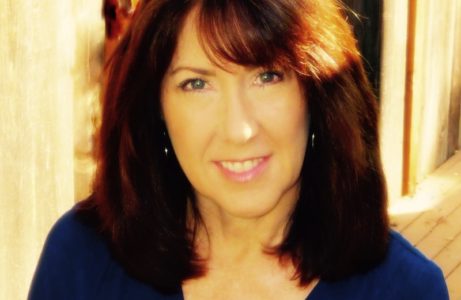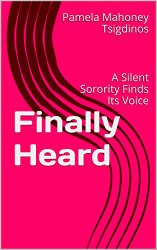Silent No More
Literary First-Aid for non-Moms

There are now many blogs and resources out there for women who had to forego parenting, for whatever reason. But when I ventured online ten years ago, there was only one.
Pamela Mahoney Tsigdinos, for my money, offers the most comprehensive treatment of the issue, first with her long-running, award-winning and popular blog, Coming2Terms, followed by her award-winning memoir, Silent Sorority: An Infertile Woman Gets Busy, Angry, Lost and Found (2010.)
She’s now taking on a misleading and often unethical fertility industry in Finally Heard: A Silent Sorority Finds It’s Voice.
Her new e-book does two things: it chronicles her continued recovery after the life-upending experience of unexplained infertility, and shines a spotlight on an often irresponsible, unregulated industry that cares little about the long term health and psychological well-being of its patients.
Below is from my amazon review:
Anyone who’s read Pam’s blog, seen her work in The New York Times, or read her interviews in the international press (which was much more open to her message) knows that she’s been at the forefront of speaking the unspeakable. She has been talking about this for a long time, and slowly, the world is starting to listen, and I’m starting to see some of her message seep through the thick membrane of mainstream media.
This book begins what I hope is a long indictment of a fertility industry that’s currently operating in a Wild West regulatory environment (at least in the U.S.) that doesn’t care about the long term health of its guinea pigs, and that financially exploits desperate would-be parents.
Here you will find links to psychological studies and research papers that spotlight both the fertility industry, and the battered psychological state of its veterans, who in the vast majority of cases, wind up without a child.
Pam is a skilled professional journalist and communicator. This book is well-written and ground-breaking, and the material in it, particularly that on the fertility industry, belongs in an Atlantic Magazine expose, or The New York Times Magazine.
From Finally Heard:
“If somebody, at the very beginning, would have explained that the infertility experience would fundamentally transform who I am, I would have approached it better prepared. When I was getting ready to go to university, I knew my life was going to change. I was going to leave university a different person than when I began. When I started down the path of confronting infertility, I had no idea that it would completely tear me down, that there was going to be a rebuilding process that was nonlinear. I wish someone had sat me down, early on, and said: Pamela, your life will fundamentally change. You are going to be a different person. There will be some days when you can get yourself together; feel under control, and then a trigger will come out of nowhere. You will collapse and have to start the rebuilding all over again.”
“It’s said that black holes are stars that collapse into themselves. My black hole started as the star that held the promise of my children. As it collapsed it became a place into which long-held dreams disappeared, never to be seen again. The magnitude of emotions released and the growth that followed over the course of the past decade has been immense.”
On being bombarded, at age 50, with renewed sales pitches from the fertility industry:
“Apparently 50 is the new 40. None of the offers make any mention of the high-stakes emotional risks. What I possess today, and didn’t have when I was 29 and just embarking on a prolonged series of medical interventions, is a healthy skepticism mixed with a dose of pragmatism. Beyond the soothing, pastel-colored collateral and banner ads all I see are one-dimensional, profit-driven motives.”
Check out her website, books and blog:
http://www.silentsorority.com
http://blog.silentsorority.com/
From Silent Sorority:
“You should never, never ask a woman when/if she’s going to have kids. If she’s already been trying for a while, it will feel like a knife to the heart. It forces her to either tell you more than she wanted to or to lie. Because if she had wanted to talk about having kids in the first place, she would have.”
“Telling a woman who has lost a baby that ‘it wasn’t meant to be’ is not compassionate. It’s merely a way of easing your own discomfort by dismissing ours. Minimizing our pain, be it offering ‘solutions’ or explanations only serves to make yourself feel better while inflicting further hurt on us … It’s hard to contemplate the randomness of the cruel universe, where bad things happen to good people, and it may make it easier for them to sleep if they can convince themselves that there is a reason for it, and we must’ve deserved it. Telling us you know what we’re going through because it took you X months to get pregnant minimizes our feelings. You had a happy ending. We may not.”
“I’ve been stripped down and made new on this journey. I’ve become utterly vulnerable, and forced to see the world differently. I’ll never have the kind of optimism that some people have that anything is possible, that it will all work out in the end.”
“I have had to take responsibility for my life in a deeper way than I ever had before. And because we live in a society where so few seem to take true responsibility for themselves and for those around them, it is very lonely. We don’t live in a world that really embraces soul-searching, and so much of this journey has been about soul-searching for me. I think a lot of the bad and unsolicited advice and glib responses to infertility (like “just adopt” or “it wasn’t meant to be”) are because people are so uncomfortable with pain and the possibility of pain with no resolution. We can’t take away the pain. All we can do is transform the response to it.”
Adapted from Silent Sorority: A (Barren) Woman Gets Busy, Angry, Lost, and Found, Copyright 2009, Pamela Mahoney Tsigdinos. www.silentsorority.com.
Pamela Jeanne’s memoir is the first honest empty-handed one-person take since:
Why Don’t You Have Kids? Living a Full Life Without Parenthood,
By Lesley Lafayette
This book, published in 1994, is a bit dated — not in the essential common sense and truth of its pronouncements, but in the boldness of the author’s opinions. They would be entirely unacceptable in today’s family-at-all-costs universe.
I found it extremely reflective of my own experience, though it won’t be to everyone’s:
“Looking back, I can see now that my desperate desire to have a baby came not from some internal biological drive, nor was it the result of thoughtful introspection and practical planning. It was my response to a hysterical society, a culture that stripped me of my intrinsic worth and told me point-blank that to fail to reproduce was to fail.”
“…there was no opposing view, no voice of reason, no organization or group to provide a dialogue.”
On giving up the baby quest: “I stopped beating myself up. You’ve heard the old joke about hitting yourself on the head with a hammer because it feels so good when you stop? It does.”
Writes the author, “I know what it is to obsessively grieve and despair because I did not fit in to what society deemed as the norm, what my peers and the media and even my government saw as acceptable and ‘fulfilled.’ I know what it feels like to be alone, to be different, to be isolated, to be ignored.”
She begs the mass media:
“Have some characters who don’t even want kids and enjoy a happy life nevertheless. Have someone opt for an abortion occasionally rather than turn wistful and blushing about her pregnancy as if she drank a cup of Instant Mommy, as if all the problems of the world will be solved when she has her baby.
“The fact that more than a million abortions are performed each year in this country is a testament that not every pregnancy is a wanted one. Writers should be free to portray real life and not the sugar and spice that conservative advertisers force upon them … tell the truth.”
She describes taking part in a T.V. talk show on women and childbearing where she was the only dissenting voice in a panel of “talking uteruses” – including a woman who, with grown children in their 30s, had an egg-donor baby at 52.
“Each and every one of them … had one goal and one goal only in her life: to produce an infant as quickly as possible, spending whatever money she had and all of the time it might take – even going into debt and emotional quicksand if necessary.”
Lafayette’s opinions would be unacceptable in today’s media environment. The trajectory of the book leads towards a directive to embrace a “Child Free” identity – to form groups and make friendships with others similarly situated. It’s a great idea, but my concern is that this further segregates the Child Free/Childless from mainstream society, when what is needed is mutual respect, interaction and consideration.
The Child Free Network she began but seems to have distanced herself from has a spotty web site that seems to have drifted from the author’s original worthy aims, degenerating into snarky commentary about “breeders.” There are articles complaining about other people’s “noisy, stinky” kids. This is certainly disappointing. Still, the original book is an honest, interesting read to balance today’s fertility-centric media message.

